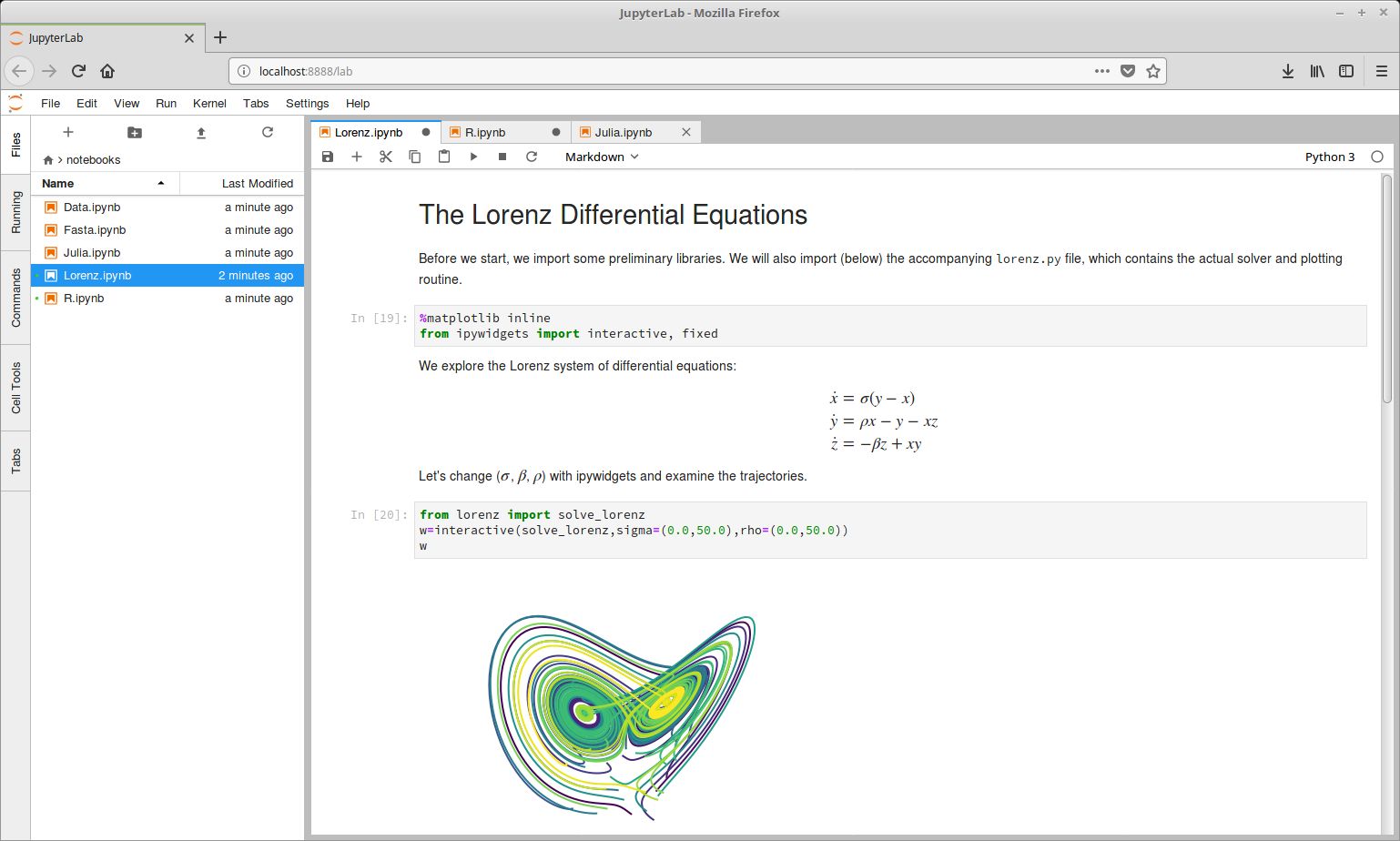JupyterLab is an extensible open source environment for interactive and reproducible computing, based on the Jupyter Notebook and Architecture.
JupyterLab is the next-generation user interface for Project Jupyter. It provides the same building blocks of the classic Jupyter Notebook (notebook, terminal, text editor, file browser, rich outputs, etc.) in a flexible and powerful user interface.
It enables you to work with documents and activities such as Jupyter notebooks, text editors, terminals, and custom components in a flexible, integrated, and extensible manner.
The software is currently in beta state but it’s ready for general usage. JupyterLab 1.0 will eventually replace the classic Jupyter Notebook.
Features include:
- Interface consists of a main work area containing tabs of documents and activities, a collapsible left sidebar, and a menu bar.
- Text editor includes syntax highlighting, configurable indentation (tabs or spaces), key maps and basic theming.
- Jupyter notebooks (.ipynb files) are fully supported. Jupyter notebooks are documents that combine live runnable code with narrative text (Markdown), equations (LaTeX), images, interactive visualizations and other rich output.
- Uses the same notebook document format as the classic Jupyter Notebook.
- Code Consoles provide transient scratchpads for running code interactively, with full support for rich output. A code console can be linked to a notebook kernel as a computation log from the notebook. Code consoles also display rich output, just like notebook cells.
- Kernel-backed documents enable code in any text file (Markdown, Python, R, LaTeX, etc.) to be run interactively in any Jupyter kernel.
- Terminals provide full support for system shells (bash, tsch, etc.) on Mac/Linux and PowerShell on Windows.
- Notebook cell outputs can be mirrored into their own tab, side by side with the notebook, enabling simple dashboards with interactive controls backed by a kernel.
- Multiple views of documents with different editors or viewers enable live editing of documents reflected in other viewers. For example, it is easy to have live preview of Markdown, Delimiter-separated Values, or Vega/Vega-Lite documents.
- Offers a unified model for viewing and handling data formats. JupyterLab understands many file formats (images, CSV, JSON, Markdown, PDF, Vega, Vega-Lite, etc.) and can also display rich kernel output in these formats.
- Customizable keyboard shortcuts and the ability to use key maps from vim, Emacs, and Sublime Text in the text editor.
- Extensions – customize or enhance any part of JupyterLab, including new themes, file editors, and custom components. JupyterLab extensions are npm packages (the standard package format in JavaScript development).
- Connect any open text file to a code console and kernel. This means you can easily run code from the text file in the kernel interactively.
- Unified architecture for viewing and editing data in a wide variety of formats.
Website: jupyter.org
Support: GitHub Code Repository
Developer: Project Jupyter Contributors
License: BSD 3-Clause License

JupyterLab is written in JavaScript and TypeScript. Learn JavaScript with our recommended free books and free tutorials. Learn TypeScript with our recommended free books and free tutorials.
Return to Data Science Notebooks
| Popular series | |
|---|---|
| The largest compilation of the best free and open source software in the universe. Each article is supplied with a legendary ratings chart helping you to make informed decisions. | |
| Hundreds of in-depth reviews offering our unbiased and expert opinion on software. We offer helpful and impartial information. | |
| The Big List of Active Linux Distros is a large compilation of actively developed Linux distributions. | |
| Replace proprietary software with open source alternatives: Google, Microsoft, Apple, Adobe, IBM, Autodesk, Oracle, Atlassian, Corel, Cisco, Intuit, SAS, Progress, Salesforce, and Citrix | |
| Awesome Free Linux Games Tools showcases a series of tools that making gaming on Linux a more pleasurable experience. This is a new series. | |
| Machine Learning explores practical applications of machine learning and deep learning from a Linux perspective. We've written reviews of more than 40 self-hosted apps. All are free and open source. | |
| New to Linux? Read our Linux for Starters series. We start right at the basics and teach you everything you need to know to get started with Linux. | |
| Alternatives to popular CLI tools showcases essential tools that are modern replacements for core Linux utilities. | |
| Essential Linux system tools focuses on small, indispensable utilities, useful for system administrators as well as regular users. | |
| Linux utilities to maximise your productivity. Small, indispensable tools, useful for anyone running a Linux machine. | |
| Surveys popular streaming services from a Linux perspective: Amazon Music Unlimited, Myuzi, Spotify, Deezer, Tidal. | |
| Saving Money with Linux looks at how you can reduce your energy bills running Linux. | |
| Home computers became commonplace in the 1980s. Emulate home computers including the Commodore 64, Amiga, Atari ST, ZX81, Amstrad CPC, and ZX Spectrum. | |
| Now and Then examines how promising open source software fared over the years. It can be a bumpy ride. | |
| Linux at Home looks at a range of home activities where Linux can play its part, making the most of our time at home, keeping active and engaged. | |
| Linux Candy reveals the lighter side of Linux. Have some fun and escape from the daily drudgery. | |
| Getting Started with Docker helps you master Docker, a set of platform as a service products that delivers software in packages called containers. | |
| Best Free Android Apps. We showcase free Android apps that are definitely worth downloading. There's a strict eligibility criteria for inclusion in this series. | |
| These best free books accelerate your learning of every programming language. Learn a new language today! | |
| These free tutorials offer the perfect tonic to our free programming books series. | |
| Linux Around The World showcases usergroups that are relevant to Linux enthusiasts. Great ways to meet up with fellow enthusiasts. | |
| Stars and Stripes is an occasional series looking at the impact of Linux in the USA. | |
